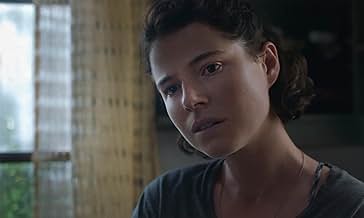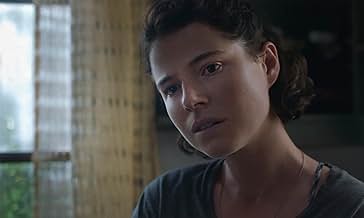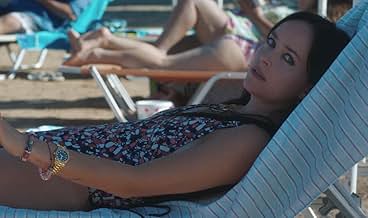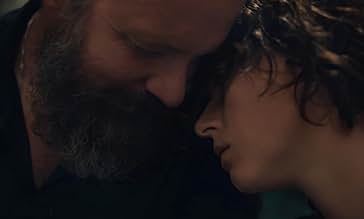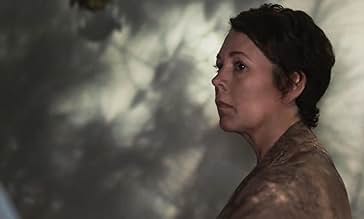Der Strandurlaub einer Frau nimmt eine dunkle Wendung, als sie beginnt, sich mit den Problemen ihrer Vergangenheit auseinanderzusetzen.Der Strandurlaub einer Frau nimmt eine dunkle Wendung, als sie beginnt, sich mit den Problemen ihrer Vergangenheit auseinanderzusetzen.Der Strandurlaub einer Frau nimmt eine dunkle Wendung, als sie beginnt, sich mit den Problemen ihrer Vergangenheit auseinanderzusetzen.
- Regie
- Drehbuch
- Hauptbesetzung
- Für 3 Oscars nominiert
- 41 Gewinne & 114 Nominierungen insgesamt
Ellie Mae Blake
- Martha
- (as Ellie Blake)
Athena Martin Anderson
- Elena
- (as Athena Martin)
Empfohlene Bewertungen
The acting is phenomenal, especially from Olivia Colman and Jessie Buckley, and it does an excellent job of getting the audience to understand the stress of parenthood. However, the film tried to build up so much tension that never reached its breaking point. Rather, it fizzles out in a very disappointing finale.
The movie is really thought provoking. Although I watched it a few weeks ago, I still think about it. The actors are very good. Especially Olivia Coleman and her younger counterpart do an amazing job. The story is not coherent, sometimes you think where does this go? ...but actually I liked this story telling style, because it is close to real life. These things happen, people behave in this way and there is not always a clear explanation given, you need to understand and find out by yourself. Overall a really good movie, recommend to watch it, especially if you have kids. I believe every parent could understand.
Elana Ferrante, the anonymous Sicilian author of "The Lost Daughter, has dedicated her entire career to the honest depiction of the complexities of what it means to be a woman. In this regard, Maggie Gyllenhall was wildly successful in her adaption of "The Lost Daughter", delivering a marvel of a screenplay that is able to tap the essence of Ferrante's work by offering an unflinching glimpse into the idealism of motherhood and then tearing it to shreds. The writing of Ferrante, infamously dense, is not easy source material to adapt into a cinematic format, instead of typical plot-driven fiction, she opts for a more heady and internally based story structure, which is why it's such a feat that Gyllenhall is able to make her script even remotely entertaining.
However, the script alone isn't what makes this movie good. It has a significant assist by three actresses: Olivia Colman in the titular role, Jessie Buckley as her younger half, and Dakota Johnson as a new mother of intrigue. Olivia Colman has clearly reached the new golden era of her career with stunning back-to-back performances: The Favorite, Flea Bag, The Crown, The Father, and now once again we find ourselves lauding her much deserved praise. Colman turns a mother, with plenty not to like, into a character that you just can't tear your eyes away from. Colman so deftly manages the swirl of emotions and outbursts of anger her character was prone to without ever showing her cards. Jessie Buckley, as her younger half, arguably gives the only warm performance in the entire film, a sharp decision in contrast to Colman's cold exterior. The merging of their singular character is helped by the incredible editing of Affonso Goncalves. Not only doing wonders for their character but the story as a whole by shuffling the order of events. Side Note: The audience is able to feel Colman's suffocation around children so thoroughly, not only because of her acting but because of the intimately claustrophobic cinematography and the unbearably well-designed sound mixing (which never lets you forget when there's a crying child in the background).
For all Gyllenhall does right here, there are a few missteps that make it hard to truly love this film. First, due to the very subtle nature of the script and the "beneath the surface" aspects of the performances, you can feel a bit emotionally isolated from all of the characters. I found myself constantly questioning if you actually cared about what's happening to any of them when it's obvious we should have. Second, the ending doesn't quite work, with Dakota Johnson invoking her mafia husband, as this was a barely established plot point that wasn't nearly developed enough to use as a cornerstone in one of the final developments in the story.
The Lost Daughter is an uncomfortable raw character study and vicious critique of what society expects from motherhood that's missing just a few key elements to seamlessly blend its story, message, and audience connectivity together.
However, the script alone isn't what makes this movie good. It has a significant assist by three actresses: Olivia Colman in the titular role, Jessie Buckley as her younger half, and Dakota Johnson as a new mother of intrigue. Olivia Colman has clearly reached the new golden era of her career with stunning back-to-back performances: The Favorite, Flea Bag, The Crown, The Father, and now once again we find ourselves lauding her much deserved praise. Colman turns a mother, with plenty not to like, into a character that you just can't tear your eyes away from. Colman so deftly manages the swirl of emotions and outbursts of anger her character was prone to without ever showing her cards. Jessie Buckley, as her younger half, arguably gives the only warm performance in the entire film, a sharp decision in contrast to Colman's cold exterior. The merging of their singular character is helped by the incredible editing of Affonso Goncalves. Not only doing wonders for their character but the story as a whole by shuffling the order of events. Side Note: The audience is able to feel Colman's suffocation around children so thoroughly, not only because of her acting but because of the intimately claustrophobic cinematography and the unbearably well-designed sound mixing (which never lets you forget when there's a crying child in the background).
For all Gyllenhall does right here, there are a few missteps that make it hard to truly love this film. First, due to the very subtle nature of the script and the "beneath the surface" aspects of the performances, you can feel a bit emotionally isolated from all of the characters. I found myself constantly questioning if you actually cared about what's happening to any of them when it's obvious we should have. Second, the ending doesn't quite work, with Dakota Johnson invoking her mafia husband, as this was a barely established plot point that wasn't nearly developed enough to use as a cornerstone in one of the final developments in the story.
The Lost Daughter is an uncomfortable raw character study and vicious critique of what society expects from motherhood that's missing just a few key elements to seamlessly blend its story, message, and audience connectivity together.
British literature professor Leda Caruso (Olivia Colman) went to Greece on a summer holiday. While she was on the beach, she finds herself obsessively observing an attractive young woman Nina (Dakota Johnson) with her headstrong little daughter Elena (Athena Martin). This made her recall her younger self in her 20s (Jesse Buckley) raising her own two daughters Bianca and Martha (Robyn Elwell and Ellie Blake).
Colman's 48-year old Leda looked like a mild-mannered academic at first glance. However, this film slowly revealed that she carries heavy psychological baggage within her over the years. These painful issues mainly revolved around her tumultuous relationship with her daughters when they were little girls, triggered back to life by seeing the seductive Nina and her Elena. More disturbing details would further unravel as Elena's doll went missing.
It was fascinating to watch Colman and Buckley's consistent portrayals of Leda at two ages in her life. Colman's Leda displayed some testy behavior that did not seem to fit the usual profile of a respectable woman of her age and stature. It was only upon meeting Buckley's young Leda through flashbacks can we understand Colman's Leda's breakdown upon meeting Nina, seeing how they shared the same dilemmas when it came with their daughters and men.
True to her provocative name from Greek myth, Leda was a woman of passion. While Buckley's young Leda had a husband Joe (Jack Farthing), she was also drawn to the intellectual genius and masculine confidence of fellow professor Hardy (Peter Skarsgaard). On her vacation, Colman's middle-aged Leda can still attract her share of male admirers, like elderly villa manager Lyle (Ed Harris) and young working student Will (Paul Mescal).
This female-centric film had an all-female creative team behind it, with Maggie Gyllenhaal on her debut as feature film director and screenplay writer, adapting the novel of Italian writer Elena Ferrante. Gyllenhaal approached the drama with palpable suspense, with gorgeous images were captured by Helene Louvart. Colman, Buckley and Johnson all turn in excellent internally-complex performances of their flawed characters.
Colman's 48-year old Leda looked like a mild-mannered academic at first glance. However, this film slowly revealed that she carries heavy psychological baggage within her over the years. These painful issues mainly revolved around her tumultuous relationship with her daughters when they were little girls, triggered back to life by seeing the seductive Nina and her Elena. More disturbing details would further unravel as Elena's doll went missing.
It was fascinating to watch Colman and Buckley's consistent portrayals of Leda at two ages in her life. Colman's Leda displayed some testy behavior that did not seem to fit the usual profile of a respectable woman of her age and stature. It was only upon meeting Buckley's young Leda through flashbacks can we understand Colman's Leda's breakdown upon meeting Nina, seeing how they shared the same dilemmas when it came with their daughters and men.
True to her provocative name from Greek myth, Leda was a woman of passion. While Buckley's young Leda had a husband Joe (Jack Farthing), she was also drawn to the intellectual genius and masculine confidence of fellow professor Hardy (Peter Skarsgaard). On her vacation, Colman's middle-aged Leda can still attract her share of male admirers, like elderly villa manager Lyle (Ed Harris) and young working student Will (Paul Mescal).
This female-centric film had an all-female creative team behind it, with Maggie Gyllenhaal on her debut as feature film director and screenplay writer, adapting the novel of Italian writer Elena Ferrante. Gyllenhaal approached the drama with palpable suspense, with gorgeous images were captured by Helene Louvart. Colman, Buckley and Johnson all turn in excellent internally-complex performances of their flawed characters.
Greetings again from the darkness. There are so many things that go unspoken about parenting, and first time writer-director Maggie Gyllenhaal specifically focuses her lens on the pressures of motherhood, by adapting the 2006 novel from the anonymous and talented and mysterious Italian writer Elena Ferrante. Of course, we are all aware of Ms. Gyllenhaal's fine work as an actor, yet it's almost beyond belief that this is her debut as a feature film director. The source material is strong, but Ms. Gyllenhaal, along with a terrific performance from Olivia Colman (Oscar winner, THE FAVOURITE, 2018), turn a coastline vacation into a mesmerizing psychological case study.
Ms. Colman proves yet again what a fine and versatile actor she is. Here she plays Leda, a divorced professor on solo holiday on a picturesque Greek island, staying in a refurbished lighthouse tended by longtime caretaker Lyle (Ed Harris). Leda is packing a satchel full of books and academia work, and is a bit perturbed when her isolated beach time is suddenly interrupted by a large and noisy family of vacationers from Queens. Being an observant loner, Leda eyes young mother Nina (Dakota Johnson) who is struggling with her daughter, as well as her husband and other family members. This triggers memories in Leda that are handled via flashbacks with a terrific Jessie Buckley (I'M THINKING OF ENDING THINGS, 2020) as young Leda, stressed out wife and mother to two daughters. She longs for her own space.
At face value, this appears to be a movie about a woman annoyed that she can't just enjoy a quiet holiday on the sandy beach as she reads her books. However, there are so many layers to the story and to Leda, that as viewers, we must remain on high alert to pick up all the queues and subtleties. Watching Nina with her daughter and husband sends Leda deep into her past ... a past that still haunts her to this day. At the same time, while gazing at Leda, Nina can't help but wonder if she is looking at her own future self.
Much of what we see (past and present) reinforces the isolation and frustration felt by so many mothers. It has nothing to do with loving one's kids, but rather maintaining one's sanity and self-being. There are a few key moments, including one that creates tension between Leda and the vacationing family, and another that immediately connects the two. Leda's past includes steps that would be considered taboo for any wife and mother, and the symmetry of her past and Nina's present are striking.
Peter Sarsgaard (director Gyllenhaal's real life husband) has a supporting role in the flashbacks, while Dagmara Dominczyk plays a critical role as Callie, part of Nina's large family. Bonus points are won with a Leonard Cohen reference (that may or may not be true), and also playing key roles here are a missing doll (connecting Leda's past and present) and the proper way to peel an orange. Cinematographer Helene Louvart works wonders balancing the beautiful setting with the not-always-beautiful actions of the characters. Especially potent here is the performance of Olivia Colman, who proves she can play most any role. It's also remarkable what first time director Maggie Gyllenhaal has accomplished here. This is a multi-layered, nuanced look at how relentless parenting can often feel overwhelming and may even lead to feelings of guilt later in life. It's rare to see such a raw look at the emotions behind what is often referred to as the joy of motherhood. The film leaves little doubt that the always-dependable actor Maggie Gyllenhaal is now one of the most interesting new filmmakers on the scene.
In select theaters on December 17, 2021 and on Netflix beginning December 31, 2021.
Ms. Colman proves yet again what a fine and versatile actor she is. Here she plays Leda, a divorced professor on solo holiday on a picturesque Greek island, staying in a refurbished lighthouse tended by longtime caretaker Lyle (Ed Harris). Leda is packing a satchel full of books and academia work, and is a bit perturbed when her isolated beach time is suddenly interrupted by a large and noisy family of vacationers from Queens. Being an observant loner, Leda eyes young mother Nina (Dakota Johnson) who is struggling with her daughter, as well as her husband and other family members. This triggers memories in Leda that are handled via flashbacks with a terrific Jessie Buckley (I'M THINKING OF ENDING THINGS, 2020) as young Leda, stressed out wife and mother to two daughters. She longs for her own space.
At face value, this appears to be a movie about a woman annoyed that she can't just enjoy a quiet holiday on the sandy beach as she reads her books. However, there are so many layers to the story and to Leda, that as viewers, we must remain on high alert to pick up all the queues and subtleties. Watching Nina with her daughter and husband sends Leda deep into her past ... a past that still haunts her to this day. At the same time, while gazing at Leda, Nina can't help but wonder if she is looking at her own future self.
Much of what we see (past and present) reinforces the isolation and frustration felt by so many mothers. It has nothing to do with loving one's kids, but rather maintaining one's sanity and self-being. There are a few key moments, including one that creates tension between Leda and the vacationing family, and another that immediately connects the two. Leda's past includes steps that would be considered taboo for any wife and mother, and the symmetry of her past and Nina's present are striking.
Peter Sarsgaard (director Gyllenhaal's real life husband) has a supporting role in the flashbacks, while Dagmara Dominczyk plays a critical role as Callie, part of Nina's large family. Bonus points are won with a Leonard Cohen reference (that may or may not be true), and also playing key roles here are a missing doll (connecting Leda's past and present) and the proper way to peel an orange. Cinematographer Helene Louvart works wonders balancing the beautiful setting with the not-always-beautiful actions of the characters. Especially potent here is the performance of Olivia Colman, who proves she can play most any role. It's also remarkable what first time director Maggie Gyllenhaal has accomplished here. This is a multi-layered, nuanced look at how relentless parenting can often feel overwhelming and may even lead to feelings of guilt later in life. It's rare to see such a raw look at the emotions behind what is often referred to as the joy of motherhood. The film leaves little doubt that the always-dependable actor Maggie Gyllenhaal is now one of the most interesting new filmmakers on the scene.
In select theaters on December 17, 2021 and on Netflix beginning December 31, 2021.
Wusstest du schon
- WissenswertesBon Jovi granted the rights to use their song "Living on a Prayer" when they learned that Olivia Colman would be singing it in the film.
- PatzerWhen Leda is greeted by Lyle as she gets out of her car, it is daylight. As soon as she enters her apartment, it is dark.
- Crazy CreditsThere's a mid-credits scene.
- SoundtracksCasual Yet Serious
Written & performed by Michael Angelo Garcia [aka Indijinouz] & Sebastian Robertson (as Sebastian Barnaby Robertson)
Courtesy of Universal Production Music
Top-Auswahl
Melde dich zum Bewerten an und greife auf die Watchlist für personalisierte Empfehlungen zu.
- How long is The Lost Daughter?Powered by Alexa
Details
- Erscheinungsdatum
- Herkunftsländer
- Offizieller Standort
- Sprachen
- Auch bekannt als
- La hija oscura
- Drehorte
- Produktionsfirmen
- Weitere beteiligte Unternehmen bei IMDbPro anzeigen
Box Office
- Weltweiter Bruttoertrag
- 703.281 $
- Laufzeit
- 2 Std. 1 Min.(121 min)
- Farbe
- Sound-Mix
- Seitenverhältnis
- 1.66 : 1
Zu dieser Seite beitragen
Bearbeitung vorschlagen oder fehlenden Inhalt hinzufügen






